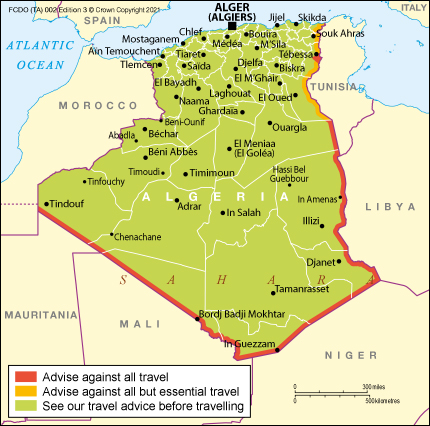Algeria
Warnings and insurance

Your travel insurance could be invalidated if you travel against advice from the Foreign, Commonwealth & Development Office (FCDO).
Areas where FCDO advises against travel
Algeria border areas
FCDO advises against all travel to within 30km of Algeria’s borders with:
- Libya
- Mauritania
- Mali
- Niger
- Tunisia – in the provinces of Illizi and Ouargla and in the Chaambi mountains area
Rest of the Algeria-Tunisia border
FCDO advises against all but essential travel to within 30km of the rest of Algeria’s border with Tunisia.
Find out more about why FCDO advises against travel.
Before you travel
No travel can be guaranteed safe. Read all the advice in this guide. You may also find it helpful to:
- see general advice for women travellers
- read our guide on disability and travel abroad
- see general advice for LGBT+ travellers
- read about safety for solo and independent travel
- see advice on volunteering and adventure travel abroad
Travel insurance
If you choose to travel, research your destinations and get appropriate travel insurance. Insurance should cover your itinerary, planned activities and expenses in an emergency.
About FCDO travel advice
FCDO provides advice about risks of travel to help you make informed decisions. Find out more about FCDO travel advice.
Get travel advice updates
Sign up to get email notifications when this travel advice is updated.
Follow FCDO: